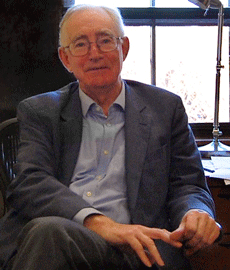We won’t see his like again
 I firstly met Tony Atkinson as professor of Microeconomics at the LSE in 1984, when he has sharing the teaching of marginal utilities and production functions with Michio Morishima. Being an advanced option, we were a small group of students, and this contributed creating a friendly environment, despite the abstruseness of many topics. He was also teaching us the fundamentals of welfare economics, but he was so respectful of his students to avoid using his textbook on Public Economics, coauthored with Joe Stiglitz as well as any reference to the then known article on inequality measurement appeared in 1970. He was also one of the few professors who was not annoyed by receiving students during his office hours, and rather patient with people like me afflicted by the compensated utility and the like. In those years it was more politically rewarding (at least for me) to speak and write on the functional distribution of income, and Megnhad Desai with his course on Marx, Keynes and Walras was absorbing most of my time in reading.
I firstly met Tony Atkinson as professor of Microeconomics at the LSE in 1984, when he has sharing the teaching of marginal utilities and production functions with Michio Morishima. Being an advanced option, we were a small group of students, and this contributed creating a friendly environment, despite the abstruseness of many topics. He was also teaching us the fundamentals of welfare economics, but he was so respectful of his students to avoid using his textbook on Public Economics, coauthored with Joe Stiglitz as well as any reference to the then known article on inequality measurement appeared in 1970. He was also one of the few professors who was not annoyed by receiving students during his office hours, and rather patient with people like me afflicted by the compensated utility and the like. In those years it was more politically rewarding (at least for me) to speak and write on the functional distribution of income, and Megnhad Desai with his course on Marx, Keynes and Walras was absorbing most of my time in reading.
It was a couple of years later that I started reading Tony’s work, beginning with the volume The economics of inequality. I still remember the back of the envelope examples in the book showing that even saving most of his income, a middle class worker would have never attained a level of wealth experienced by the rich in any country. For the first time I got the image that there was a back side to the models of class struggle that I liked so much. The same experience occurred later on, at the beginning of the 90’s, when I started working on intergenerational mobility. Once more Tony was there, with his article on intergenerational mobility. Two things struck me in that paper: the place of publication (by that time, the Journal of Postkeynesian Economics was attracting most of the debate about alternative measures of liquidity and the like) and the data he was using (coming from a survey taken York in UK). There I discovered that Tony was a militant, in the sense of being able to use any opportunity to progress in his personal project. Any data source of decent quality would have been appropriate to highlight some hidden aspect of inequality generation. I was also admired by his ease and talent in theory building, framing his thoughts in the bare language of math.
I then met Tony’s work several other times in my research life. I was visiting at Wider, the UN center in Helsinky when they were starting collecting data on inequality from secondary sources (the WIID project), and the JEL article of Atkinson and Brandolini came as a cold shower. I remember the discussion about what was perceived as an extremist position, while it was a plea for rigour in order to make the policy prescriptions more credible.
I used the introductory chapter of the Handbook on Income Distribution, edited by him and François Bourguignon, several times when teaching Economics of Inequality, or even Labour economics in different universities. And the message was always there: inequality is different from randomness, we have to understand how it is generated, and what can we do when we think it being excessive. Their insistence on jointly studying functional and personal distributions of incomes was actually asking for reconciling macro and micro approaches in economic theory. Which is still an unattained dream for many economists.
I met again Tony in conferences (most recently at the Festival of Economics, taking place yearly in Trento, northern Italy) and he was always friendly and willing to joke (despite the English sense of humor and the Italian one do not always talk to each other). The acquaintance with Tony was one of the main reasons for my application to the position of Director of the Luxembourg Office of LIS: working together for the research promotion in the field of inequality analysis seemed to me a great opportunity to learn from him, even after 32 years from the LSE time. We had one chance, last July, to discuss strategies of development for LIS over a couple of days, and he was as I had always known him: friendly, open to discussion and never self-promoting. All virtues which are jointly infrequent in the academia, as well as in the political debates. We have to work hard not to disperse his legacy.
Daniele Checchi
Director of the Luxembourg Office of LIS
